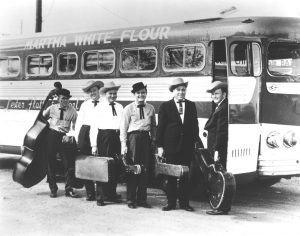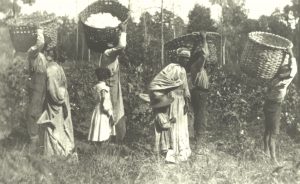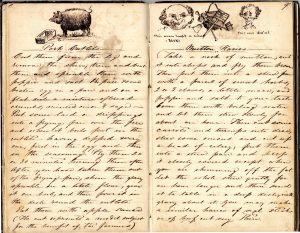These collections are ones that have had their finding aids recently revised.
REVISED:
Coker, William (#3220)
William Chambers Coker was a botanist, teacher, writer, who taught at the University of North Carolina, 1902-1945, serving as chair of the Department of Botany and editor of the journal of the Elisha Mitchell Scientific Society.
The collection includes correspondence and other personal and professional records of William Chambers Coker, chiefly 1914-1950. Coker’s papers concern family and personal business matters; his research, writing, and international correspondence as a botanist; his activities at the University of North Carolina as a professor and as chair of the Botany Department for 36 years; the journal of the Elisha Mitchell Scientific Society, of which he was editor, 1904-1945; and numerous civic interests. Also included are Coker’s notebooks titled “Plants of Chapel Hill”; files of Alma Holland of the Botany Department as editor of the yearbook of the Garden Club of North Carolina, 1940-1941; files of the Highlands Museum and Biological Laboratory, 1930-1950; and files of the Division of Design and Improvement of School Grounds, University of North Carolina Extension Bureau. Also included are Coker’s research notes on his studies of mycology; notes and drawings on various fungi; photographs, field notes, and drawings of plants; blueprints related to what became the Coker Arboretum at the University of North Carolina; and correspondence with Coker’s family and friends.
Dabbs, James McBride (#3816)
James McBride Dabbs (1896-1970) was a professor of English at the University of South Carolina and Coker College, Presbyterian churchman, writer, civil rights leader, Penn School Community Services trustee, Southern Regional Council president, and farmer of Mayesville, S.C. He also worked with the South Carolina Council on Human Relations, the Fellowship of Southern Churchmen, the Committee of Southern Churchmen, the Council on Church and Society, and the Delta Ministry.
The collection consists of correspondence, writings, subject files, administrative records, and other materials that document Dabbs’s professional involvements and interests, including his leadership roles in civil rights councils, religious organizations, and other groups. Almost all of the papers date from 1923 to shortly before Dabbs’s death in 1970. Topics include observations on social and political issues of the day (especially in the American South), concerns about racial inequalities and segregation, Dabbs’s opposition to the House Committee on Un-American Activities, and Dabbs’s own life and religious beliefs. Most writings are drafts are of books, articles, addresses, short stories, poems, and other writings by Dabbs, and most correspondence is between Dabbs and fellow political and religious group members, publishers, and readers of his articles and books. There is light and scattered correspondence with prominent authors, activists, and historians, including Anne Braden, Sarah Patton Boyle, Hodding Carter, Isabel Fiske Conant, Paul Green, Myles Horton, George Mitchell, Eudora Welty, and C. Vann Woodward, among others; some writings by others; and a few photographs of Dabbs’s university and church colleagues.
Delta Health Center (#4613)
The Delta Health Center was established in the mid-1960s, in the rural, all-African American town of Mound Bayou, Bolivar County, Miss., and served Bolivar, Coahoma, Sunflower, and Washington counties, where poverty was widespread. The Center, which was federally funded through Tufts University and later through the State University of New York at Stony Brook, was one of the first community health centers in the United States. The comprehensive community health center model aimed at building upon traditional health services by addressing the underlying causes of illness, including economic, environmental, and social factors. Originally, Jack Geiger served as project director and John Hatch as director of community health action.
The collection contains business files documenting the establishment and operations of the Delta Health Center, including the efforts of John Hatch, Jack Geiger, and others to obtain and maintain federal funding for the Center from the Office of Economic Opportunity; the Department of Health, Education, and Welfare; and the Department of Health and Human Services. Major topics include health care for minorities and impoverished communities, social medicine, nutrition, environmental health, and medical education and training. Materials document the economic, social, and health conditions of the residents of the Mississippi Delta, especially the African American community in northern Bolivar County; John Hatch and L. C. Dorsey’s efforts with the North Bolivar County Cooperative Farm and Cannery; the role of the North Bolivar County Health and Civic Improvement Council; and the Delta Health Center’s relationship with other health facilities, medical schools, and outreach programs, including the Mound Bayou Community Hospital (with which it merged in 1972), Meharry Medical College, the Delta Ministry, and the Columbia Point Health Center (now the Geiger-Gibson Community Health Center), and others. Included are administrative records, correspondence, financial materials, grant proposals, legal materials, personnel files, reports, studies, education and training materials, publicity materials, photographs, printed matter, and other items. Of note are newspaper articles, protest photographs, and other items related to Mississippi Governor Bill Waller’s vetos of the Delta Community Health Center and Hospital’s federal funding, and photographs of the Selma-to-Montgomery voting rights marches in March 1965. Audio recordings include speeches of and interviews with persons connected with the Delta Health Center, among them director Andrew James. Also included is a recording of Stokeley Carmichael speaking at North Carolina Central University in March 1970 and a recording of a 1968 speech by Martin Luther King Jr. at the Delta Ministry’s Mount Beulah Conference Center in Edwards, Miss.
Jones, Charles Miles (#5168)
Charles Miles Jones, Christian minister and social justice activist, spent the majority of his ecclesiastical career in Chapel Hill, N.C., at the head of the Chapel Hill Presbyterian Church and then as the first minister of the Community Church.
The collection includes correspondence, church documents and publications, clippings, and other items reflecting Jones’s ministry and concern for civil rights. Materials generally focus on his public rather than personal life with a special emphasis on the 1952-1953 investigation of his Chapel Hill Presbyterian Church ministry. General correspondence includes letters from supporters (among them Frank Porter Graham) and detractors, commenting on the investigation, Jones’s sermons, and several well-publicized actions in support of social justice causes. Also included is official correspondence of the investigation and formal documentation of the proceedings, as well as scattered church newsletters, copies of a 1945 petition to remove Jones and the elders’ rejection of it, and other items. The Community Church period is chiefly represented by financial and administrative materials, while Jones’s activist role is reflected in pamphlets, official correspondence, and Fellowship of Southern Churchmen documents. Among the materials on Jones’s activism are several items relating to his involvement in the 1947 “Journey of Reconciliation” (or “Freedom Ride”), including “We Challenged JIM CROW!” a pamphlet by George House and Bayard Rustin; a handwritten account of Jones’s involvement; photocopies of court transcripts; and notes. Other papers consist mainly of clippings, honors accorded Jones, memorials upon his death, and materials relating to the published biography of him written by grandson Mark Pryor.
Ehle, John (#4555)
John Marsden Ehle Jr., author of novels and works of non-fiction, was born in Asheville, N.C., and has lived most of his adult life in Winston-Salem. He served as special assistant to North Carolina Governor Terry Sanford, 1963-1964, and has been instrumental in establishing and furthering many significant educational, desegregation, and anti-poverty projects. He is married to British actress Rosemary Harris.
The collection documents both the literary career and public service activities of John Ehle. Literary materials include correspondence, clippings, and financial items relating to Ehle’s novels and other works, as well as notes, drafts, and galleys. Family items include correspondence of Ehle’s parents and a few items relating to Rosemary Harris. Other materials relate to Ehle’s work with various public and private institutions. These include files generated in the course of Ehle’s work in the Governor’s Office, especially his efforts on behalf of the North Carolina School of the Arts and the North Carolina School of Science and Mathematics. There are also files relating to the Ford Foundation, the National Endowment for the Humanities, the National Federation for the Arts and Humanities, Duke University, and the Penland School of Crafts. Photographs and audiovisual materials include family photographs and photographs used as book illustrations, including some of activists protesting segregation in Chapel Hill, N.C., that were taken for use in The Free Men (1965); audiodiscs of radio shows that Ehle wrote or acted in; tapes of interviews done for various books; and filmstrips, chiefly on North Carolina history, which Ehle produced, sometimes in collaboration with others. A few items relate to Rosemary Harris.





